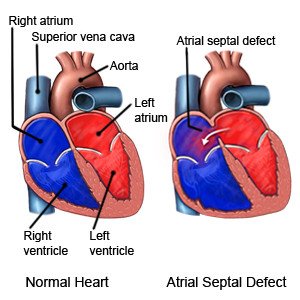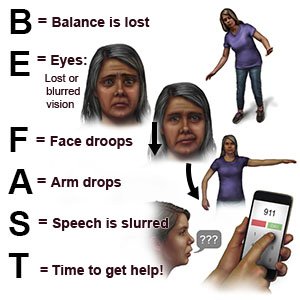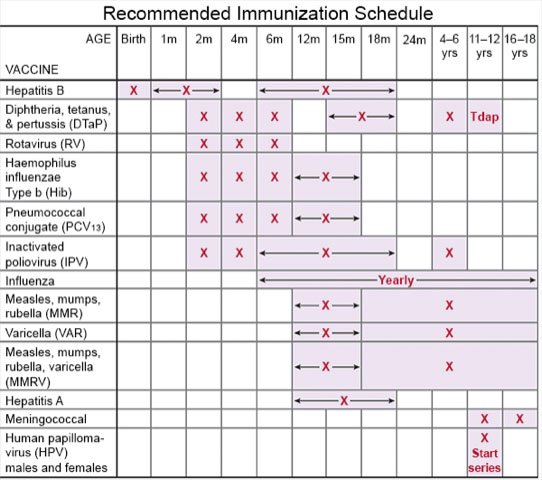Atrial Septal Defect in Children
Medically reviewed by Drugs.com. Last updated on Aug 4, 2025.
AMBULATORY CARE:
An atrial septal defect (ASD)
is a hole in the septum (wall) between the upper chambers (atria) of your child's heart. The hole may be small or large. An ASD causes a problem with the way blood moves through your child's heart. This makes his or her heart work harder to pump blood. Over time, an ASD can damage your child's heart and lungs. An ASD can also lead to a stroke if a blood clot is pumped out to a blood vessel in your child's brain.
 |
Common signs and symptoms of ASD:
Your child may not have any symptoms, even if the ASD is large. Instead, your child may start having symptoms when he or she gets older. He or she may have any of the following:
- Feeling his or her heartbeat skip or flutter in his or her chest
- Colds or lung infections that happen often
- Chest pain
- Lips and fingernails that turn blue with long periods of crying
- Shortness of breath that is worse during activity
- Slow growth or problems gaining weight
- Tiring easily, especially while feeding or eating
Call your local emergency number (911 in the US) for any of the following:
- Your child has severe chest pain.
- Your child has trouble breathing or sudden shortness of breath.
- Your child coughs up blood.
- Your child loses consciousness or stops breathing.
- Your child has any of the following signs of a stroke:
- Part of his or her face droops or is numb
- Weakness in an arm or leg
- Confusion or difficulty speaking
- Dizziness, a severe headache, or vision loss
Seek care immediately if:
- Your child is more short of breath than usual.
- Your child's heart is beating faster than usual.
- Your child has swelling in his or her legs or ankles.
- Your child has severe abdominal pain or his or her abdomen is larger than usual.
Call your child's cardiologist if:
- Your child has a fever.
- Your child has chills, a cough, or feels weak and achy.
- Your child is not gaining weight as he or she should.
- You have questions or concerns about your child's condition or care.
Warning signs of a stroke:
The word F.A.S.T. can help you remember and recognize warning signs of a stroke.
- F = Face: One side of the face droops.
- A = Arms: One arm starts to drop when both arms are raised.
- S = Speech: Speech is slurred or sounds different than usual.
- T = Time: A person who is having a stroke needs to be seen immediately. A stroke is a medical emergency that needs immediate treatment. Most medicines and treatments work best the sooner they are given.
 |
Treatment
may not be needed if the ASD is small and your child does not have any symptoms. A small ASD may close on its own within the first year of life. Your child may need any of the following:
- Medicine may be given to strengthen your child's heart or control his or her heartbeat. Medicine may also be given to lower pressure in your child's lungs, prevent blood clots, or remove extra fluid.
- Open heart surgery may be needed to close the ASD with stitches or a patch.
- Cardiac catheterization is a procedure that is used to close the ASD through a catheter (thin tube). The catheter is placed into an artery in your child's groin and guided up to his or her heart. A small stitch or patch is used to close the hole.
Care for your child:
- Do not smoke near your child. Do not let your older child smoke. Nicotine and other chemicals in cigarettes and cigars can cause lung and heart damage. Ask your healthcare provider for information if you or your older child currently smoke and need help to quit. E-cigarettes or smokeless tobacco still contain nicotine. Talk to your healthcare provider before you or your older child use these products.
- Feed your child heart-healthy foods. Feed your child more fresh fruits and vegetables. Feed him fewer canned and processed foods. Replace butter and margarine with heart-healthy oils such as olive oil and canola oil. Other heart-healthy foods include walnuts, whole-grain breads, low-fat dairy products, beans, and lean meats. Fatty fish such as salmon and tuna are also heart healthy.
- Ask your child's healthcare provider if you need to limit his or her activity. Your child may need to avoid strenuous activities to decrease his or her symptoms. Examples include running, lifting, and swimming. Your child may also need to avoid scuba diving or hiking in high altitudes. These activities may put too much stress on his or her heart.
- Ask about vaccines your child needs. Vaccines help decrease your child's risk for infections. Infections can make your child's condition worse. The influenza (flu) vaccine is given yearly, starting at age 6 months. Your child's healthcare provider will tell you which vaccines your child needs and when to get them.

Follow up with your child's cardiologist as directed:
Your child will need to return for more tests to see if the ASD closes on its own. Write down your questions so you remember to ask them during your child's visits.
© Copyright Merative 2025 Information is for End User's use only and may not be sold, redistributed or otherwise used for commercial purposes.
The above information is an educational aid only. It is not intended as medical advice for individual conditions or treatments. Talk to your doctor, nurse or pharmacist before following any medical regimen to see if it is safe and effective for you.
Learn more about Atrial Septal Defect
- Atorvastatin (Lipitor): Top 12 Drug Facts You Need to Know
- Do blood pressure drugs interact with alcohol?
- Side Effects of Weight Loss Drugs
Treatment options
Care guides
- Adult Congenital Heart Disease
- Atrial Septal Defect
- Atrial Septal Defect in Children
- Congenital Heart Disease in Children
Medicine.com guides (external)
Further information
Always consult your healthcare provider to ensure the information displayed on this page applies to your personal circumstances.
